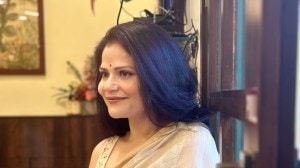Express@Cannes: Johnny Depp’s reluctant ‘comeback’; dual tale of a child’s bully
Written and directed by Maiwenn, the film is a good-looking bon-bon with an undemanding flavour; it pleases the eye, but doesn’t linger. Maiwenn, who also plays the titular role of Jeanne—a low-born woman who uses her wily intelligence to dazzle the Versailles court, gifts herself the meatiest part.
 (From left) ‘Jeanne du Barry’ director Maiwenn and cast members Johnny Depp and Pauline Pollmann. Reuters
(From left) ‘Jeanne du Barry’ director Maiwenn and cast members Johnny Depp and Pauline Pollmann. Reuters A big part of what a major Hollywood star can do for the inaugural night of a festival which has no death of starry glitter was evident when Johnny Depp arrived at the Cannes Red Carpet. Selfie-demanding hordes mobbed the fifty-nine-year old actor, even if his appeal has dimmed somewhat recently. After graciously submitting to requests, Depp led us into his character of Emperor Louis XV in Jeanne Du Barry, the opening film of the 76th edition of the festival.
As a performance, it was relatively subdued, far removed from his usual flamboyance. But never for a moment were we allowed to forget that this was Depp—doing his thing, on and off the red carpet.
Written and directed by French actor Maiwenn, the film is a good-looking bon-bon with an undemanding flavour; it pleases the eye, but doesn’t linger. Maiwenn, who also plays the titular role of Jeanne—a low-born woman who uses her wily intelligence to dazzle the Versailles court, gifts herself the meatiest part. We see her being thrown out of a nunnery because of her salty tastes: it is just that spark which refused to kow-tow to the courtiers, that the King gets drawn to.
It’s no secret that the long-drawn, contentious trial with his ex-wife Amber Heard has diminished Depp’s standing amongst Hollywood royalty. Responding to a question about the choice of the opening film, Cannes Film Festival Chief Thierry Fremaux said that he was unconcerned with Hollywood barometers. As far as he was concerned, Fremaux said, it was to do with the ‘freedom of thinking and choice’.
While the hoopla at the French Riviera may have resurrected Depp in the public eye, he refused to call the film a ‘comeback’.
There’s also no doubt that he can still command a scene. At a point when Jeanne is disheartened because the royals are still ignoring her, Louis sweeps in. He mimes his displeasure with minute brow lifts and pursing of the lip. It lasts barely a minute, but there’s Johnny doing the job he was hired for. And it’s what you take away from the film.
Monsters
Hirokazu Kore-eda is back in Cannes competition with Monsters, a film in which you can see the recurring motifs that the 61-year old Japanese director engages with: dysfunctional families, single parents struggling to raise children, and societal mores which do not allow people to flower.
A young boy starts to behave strangely all of a sudden. His mother is concerned: is it the result of being bullied at school? The confrontation with the principal of his school and a young teacher leads to the possibility that all may not be as it seems. In a very Rashomon-like treatment, we see everything being flipped on its head once the perspective and the perceiver changes. Is the victim of bullying himself a bully?
Kore-eda won the Palme D’Or in 2018 for his wonderful Shoplifters, a film which toplined the thought that you can create your own family—that you don’t just have to be tied by blood. Monsters, by comparison, is Kore-eda in minor key, but it is a film which doesn’t duck from saying that we all have monsters that live within—the trick is to know and understand your monster.
Photos



- 01
- 02
- 03
- 04
- 05




























